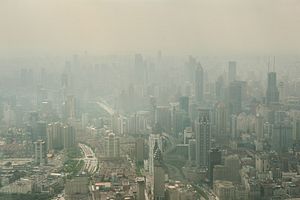In China, “APEC blue” was the sarcastic term used to refer to the unusually clear skies Beijing enjoyed when an Asia-Pacific leaders summit was in progress late last year.
A similar phenomenon is now being seen in smaller Chinese cities, as mayors are summoned to the Ministry of Environmental Protection (MEP) for “chats,” resulting in sudden improvements in air quality. Mayors or their deputies from around ten cities have been ordered to Beijing to explain to environment ministry officials why levels of air pollution have remained so bad.
With demands for swift and decisive action ringing in their ears, municipal leaders have responded by ordering drastic measures, such as tough curbs on sectors including vehicle use, construction, and the burning of coal, all of which produce tiny particulate matter deemed extremely harmful to human health.
The Henan city of Zhengzhou saw a miraculous improvement in July, after suffering awful air quality for the first half of the year. More than three weeks ago, air quality reached a “good” level, and almost vaulted the city into the “excellent” category.
In Zhengzhou’s case, an improvement took root before Ma Yi, the city’s mayor, met with the Ministry of Environmental Protection, also in the final week of July. Residents of the Henan city poked fun at the timing of the improvement, referring to it as “chatting blue.” Zhengzhou environment officials said curbs on a range of emitting sectors including cars, construction and coal had played a large part, but acknowledged that the better air quality typically seen in July and August had also been a factor.
But the MEP has demanded that tough measures are taken over the longer term, and asked Zhengzhou to prepare and submit a plan on how it will address the problems. The central government may suspend approval of new factories and buildings if the city does not show some progress in six months.
In the first half of the year Zhengzhou’s air quality ranked 71 out of 74 cities in a government survey, bringing it under closer scrutiny from an increasingly empowered MEP.
Other cities are experiencing bluer skies after the dreaded summons to Beijing. Against the backdrop of China’s National People’s Congress in March, Zhang Shuping, the mayor of Linyi in Shandong province, was obliged to take drastic measures against pollution after a meeting with the central government. Upon Zhang’s return, 412 factories were ordered to clean up their operations and 57 forced to close down while changes were made. Small, antiquated operations with little hope of improvement shut down for good.
The “Linyi model” became a fevered topic of debate in policy circles. Some local officials and industry bosses complained that shutting down polluting factories would harm the city’s economy and throw many workers onto the unemployment scrapheap. But the majority of Linyi’s environmental officials and members of the public appeared supportive.
Since March, around 20 company bosses and mayors have endured a “walk of shame” to appear for meetings with the MEP, after which officials in city administrations have been warned, formally criticized, or even fired in a bid by city bosses to deliver rapid improvements. After the mayor of Ma’anshan in Anhui province was ordered to Beijing, four senior cadres in the city who failed to pull their weight on environmental issues were demoted, and one deputy county head had a serious offense added to his official record.
Despite the seriousness that a summoning to Beijing entails, some commentators feel the measures haven’t gone far enough and that a wider pool of high-ranking officials should explain poor pollution figures to the central government.
Cadres being groomed for the post deputy provincial governor should be ordered to attend, as well as city Communist Party secretaries, said Chang Jiwen, deputy head of the Resources and Environment Policy Institute, part of the State Council’s Development Research Center. Summoning more officials could spur tougher action and help prevent chronic pollution levels from reoccurring, Chang said.
Preventing air quality from creeping back toward the woeful levels seen earlier this year is likely to be one of the major remits of the MEP’s harder focus on prefecture level cities.
The central government will be mindful of the short-lived nature of improved air quality in Beijing around the time of the 2008 Olympic Games, after which many curbs on polluters were lifted and heavy industries in neighboring provinces cranked up output, contributing to off-the-scale smog levels.
Liu Qin is editor in chinadialogue‘s Beijing office.
This post was originally published by chinadialogue and appears with kind permission.

































